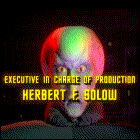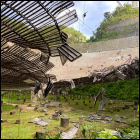Herbert F. Solow, producer, dies
 Hired by Lucille Ball to help turn around the fortunes of Desilu Studios in the 1960s following her divorce from studio co-founder Desi Arnaz, producer and production executive Herbert F. Solow became known as “the man who sold Star Trek” – namely, he pitched the series to the networks, and finally made a sale to NBC, getting the storied science fiction series on the air at last. Solow also sold CBS on the spy-fi series Mission: Impossible at the same time, and later scored another major sale to CBS in the form of the detective series Mannix. He adapted (from a novel) and produced the early 1970s TV movie adaptation Killdozer, and co-created the late ’70s sci-fi series Man From Atlantis. He also went on to add “movie producer” to his resume; in later years, he looked back fondly upon his role in starting the Star Trek franchise with such biographical books as “Inside Star Trek: The Real Story“. Herb Solow died at the age of 89.
Hired by Lucille Ball to help turn around the fortunes of Desilu Studios in the 1960s following her divorce from studio co-founder Desi Arnaz, producer and production executive Herbert F. Solow became known as “the man who sold Star Trek” – namely, he pitched the series to the networks, and finally made a sale to NBC, getting the storied science fiction series on the air at last. Solow also sold CBS on the spy-fi series Mission: Impossible at the same time, and later scored another major sale to CBS in the form of the detective series Mannix. He adapted (from a novel) and produced the early 1970s TV movie adaptation Killdozer, and co-created the late ’70s sci-fi series Man From Atlantis. He also went on to add “movie producer” to his resume; in later years, he looked back fondly upon his role in starting the Star Trek franchise with such biographical books as “Inside Star Trek: The Real Story“. Herb Solow died at the age of 89.
Arecibo Observatory slated for demolition
 After being in operation for most of the past 57 years, the fate of the Arecibo Radio Telescope facility is sealed by the failure of two major tension cables suspending the 900-ton equipment platform over the dish carved into the Puerto Rican countryside. Engineering safety assessments reveal that other cables are on the verge of failure, which could lead to an “uncontrolled collapse” putting the lives of nearby researchers and engineers at risk. As a result, the Arecibo facility – originally a project of Cornell University but now managed by the University of Central Florida – is slated for demolition as soon as is safely possible, provided its aging superstructure doesn’t collapse under its own weight first. The observatory’s physical superstructure had been under close observation since suffering major damage from Hurricane Maria, which caused widespread destruction in Puerto Rico in 2017. The closure of the Arecibo facility marks the end of a significant era of radio astronomy.
After being in operation for most of the past 57 years, the fate of the Arecibo Radio Telescope facility is sealed by the failure of two major tension cables suspending the 900-ton equipment platform over the dish carved into the Puerto Rican countryside. Engineering safety assessments reveal that other cables are on the verge of failure, which could lead to an “uncontrolled collapse” putting the lives of nearby researchers and engineers at risk. As a result, the Arecibo facility – originally a project of Cornell University but now managed by the University of Central Florida – is slated for demolition as soon as is safely possible, provided its aging superstructure doesn’t collapse under its own weight first. The observatory’s physical superstructure had been under close observation since suffering major damage from Hurricane Maria, which caused widespread destruction in Puerto Rico in 2017. The closure of the Arecibo facility marks the end of a significant era of radio astronomy.
Daleks!: The Sentinel Of The Fifth Galaxy
 The BBC releases the second episode of Daleks!, an animated Doctor Who spinoff centered around that franchise’s most enduring villains, on YouTube, featuring the voices of Joe Sugg and Nicholas Briggs. This is part of the “Time Lord Victorious” alternate-timeline multimedia event.
The BBC releases the second episode of Daleks!, an animated Doctor Who spinoff centered around that franchise’s most enduring villains, on YouTube, featuring the voices of Joe Sugg and Nicholas Briggs. This is part of the “Time Lord Victorious” alternate-timeline multimedia event. 